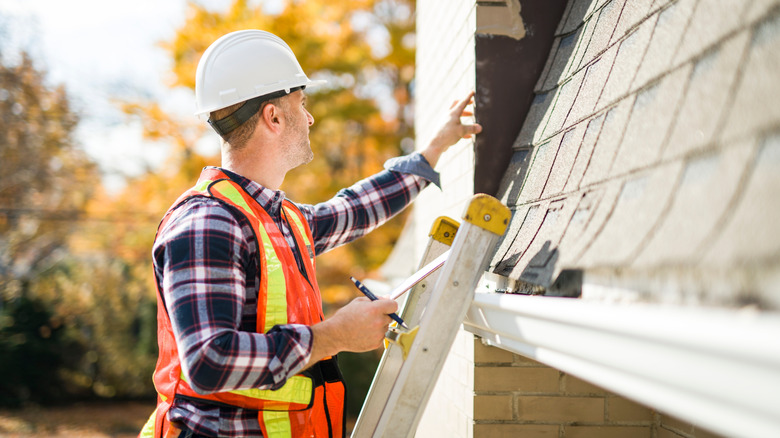Here's Why Your Roof Is Making A Popping Sound (& What To Do)
We may receive a commission on purchases made from links.
Hearing sounds from the upper part of your house can be disturbing at any time, though especially when you're trying to unwind at the end of a long day, and it can often lead you to wonder why you might have noises in your attic and if you should be doing anything about it. Well, if the popping sound coming from your roof is relatively infrequent, then it is likely you don't need to worry too much.
Irregular pops that are few and far between can be caused by a change in temperature or pressure, occasioned by shifting seasons, humidity levels, or cooler night temperatures as the sun goes down. A roof is typically composed of a variety of elements including wood supports, insulation, metal flashing, underlayment, and shingles. Each of these materials can be affected by rising or dropping temperatures, causing them to expand or compress at different times. If the popping generally occurs with an increase in humidity or you have noticed frequent dampness in your attic, you may be able to lessen the sound by installing a ventilation aid such as a roof mount attic fan from Home Depot. In addition, even if the noises are relatively rare, you may wish to have a quick look at the roof just to make sure there is no damage to the structure of the building that could be causing the pops. However, the roof is the key part of your home you should always splurge on, and if you are regularly hearing loud popping sounds from your roof, it could be a sign of something more serious.
What to do if you hear your roof popping often
If you are noticing a lot of noise coming from the attic, then it is likely a good idea to look for other symptoms of a larger problem. For example, any leaking water, wet spots on the ceiling, or missing shingles could be a sign of a hole in the roof. If you listen to the noise and it sounds steady rather than intermittent, then it could be a sign of a hidden leak. This should be checked out by a professional because leaks can cause structural damage, mold, and can even create a fire hazard if the water comes in contact with electricity. Once examined, the inspector can advise whether your roof needs replacing ASAP.
Alternatively, if your roof is making extra popping noises in fall or winter weather, this could be a sign that it is under an unusual amount of pressure. In fall, this could be a result of excess leaves or tree droppings collecting on the roof and becoming heavier when wet. In winter, snow and repeatedly frozen ice can end up causing added strain on your roof which may result in frequent popping or groaning. In these cases, it is a good idea to regularly empty out your gutters and keep them clear of debris. You may also want to consult a professional to check whether your roof needs renovation to more effectively divert ice and melting snow.

